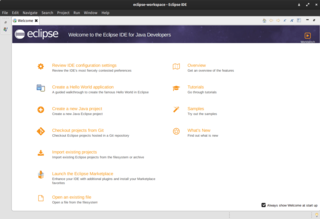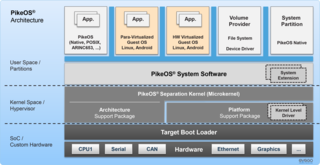Network management is the process of administering and managing computer networks. Services provided by this discipline include fault analysis, performance management, provisioning of networks and maintaining quality of service. Network management software is used by network administrators to help perform these functions.

Eclipse is an integrated development environment (IDE) used in computer programming. It contains a base workspace and an extensible plug-in system for customizing the environment. Eclipse is written mostly in Java and its primary use is for developing Java applications, but it may also be used to develop applications in other programming languages via plug-ins, including Ada, ABAP, C, C++, C#, Clojure, COBOL, D, Erlang, Fortran, Groovy, Haskell, JavaScript, Julia, Lasso, Lua, NATURAL, Perl, PHP, Prolog, Python, R, Ruby, Rust, Scala, and Scheme. It can also be used to develop documents with LaTeX and packages for the software Mathematica. Development environments include the Eclipse Java development tools (JDT) for Java and Scala, Eclipse CDT for C/C++, and Eclipse PDT for PHP, among others.
Java Management Extensions (JMX) is a Java technology that supplies tools for managing and monitoring applications, system objects, devices and service-oriented networks. Those resources are represented by objects called MBeans. In the API, classes can be dynamically loaded and instantiated. Managing and monitoring applications can be designed and developed using the Java Dynamic Management Kit.
Java Card refers to a software technology that allows Java-based applications (applets) to be run securely on smart cards and similar small memory footprint devices. Java Card is the tiniest of Java platforms targeted for embedded devices. Java Card gives the user the ability to program the devices and make them application specific. It is widely used in ATM cards. The first Java Card was introduced in 1996 by Schlumberger's card division which later merged with Gemplus to form Gemalto. Java Card products are based on the Java Card Platform specifications developed by Sun Microsystems. Many Java card products also rely on the GlobalPlatform specifications for the secure management of applications on the card.

PikeOS is a commercial, hard real-time operating system (RTOS) that offers a separation kernel based hypervisor with multiple logical partition types for many other operating systems and applications. It enables users to build certifiable smart devices for the Internet of things according to the high quality, safety and security standards of different industries.

Adobe AIR is a cross-platform runtime system currently developed by Harman International for building desktop applications and mobile applications, programmed using Adobe Animate, ActionScript, and optionally Apache Flex. It was originally released in 2008. The runtime supports installable applications on Windows, macOS, and mobile operating systems, including Android, iOS and BlackBerry Tablet OS.
OpenESB is a Java-based open-source enterprise service bus. It can be used as a platform for both enterprise application integration and service-oriented architecture. OpenESB allows you to integrate legacy systems, external and internal partners and new development in your Business Process. OpenESB is the unique open-source ESB relying on standard JBI, XML, XML Schema, WSDL, BPEL and Composite application that provides you with simplicity, efficiency, long-term durability, and savings on your present and future investments with a very low TCO.
In the context of computer programming, instrumentation refers to the measure of a product's performance, to diagnose errors, and to write trace information. Instrumentation can be of two types: source instrumentation and binary instrumentation.
VisualVM is a tool that provides a visual interface for viewing detailed information about Java applications while they are running on a Java Virtual Machine (JVM). VisualVM organizes JVM data that is retrieved by the Java Development Kit (JDK) tools and presents the information in a way that allows data on multiple Java applications to be quickly viewed—both local applications and applications that are running on remote hosts. Programmers can also capture data about the JVM software and save the data to the local system, and then view the data later or share it with others. VisualVM is built on the NetBeans Platform; its architecture is modular and easy to extend with plugins.
JACK Intelligent Agents is a framework in Java for multi-agent system development. JACK Intelligent Agents was built by Agent Oriented Software Pty. Ltd. (AOS) and is a third generation agent platform building on the experiences of the Procedural Reasoning System (PRS) and Distributed Multi-Agent Reasoning System (dMARS). JACK is one of the few multi-agent systems that uses the BDI software model and provides its own Java-based plan language and graphical planning tools.

libvirt is an open-source API, daemon and management tool for managing platform virtualization. It can be used to manage KVM, Xen, VMware ESXi, QEMU and other virtualization technologies. These APIs are widely used in the orchestration layer of hypervisors in the development of a cloud-based solution.
The Java Development Kit (JDK) is an implementation of either one of the Java Platform, Standard Edition, Java Platform, Enterprise Edition, or Java Platform, Micro Edition platforms released by Oracle Corporation in the form of a binary product aimed at Java developers on Solaris, Linux, macOS or Windows. The JDK includes a private JVM and a few other resources to finish the development of a Java application. Since the introduction of the Java platform, it has been by far the most widely used Software Development Kit (SDK).
Virgo is an open source, OSGi-based, Java application server. Virgo supports the deployment of OSGi bundles and unmodified Java web applications as well as OSGi-influenced Shared Libraries WARs and Shared Services WARs.
The JBoss Enterprise Application Platform is a subscription-based/open-source Java EE-based application server runtime platform used for building, deploying, and hosting highly-transactional Java applications and services developed and maintained by Red Hat. The JBoss Enterprise Application Platform is part of Red Hat's Enterprise Middleware portfolio of software. Because it is Java-based, the JBoss application server operates across platforms; it is usable on any operating system that supports Java. JBoss Enterprise Application Platform was originally called JBoss and was developed by the homonym company JBoss, acquired by Red Hat in 2006

SNAMP is an open-source, cross-platform software platform for telemetry, tracing and elasticity management of distributed applications.